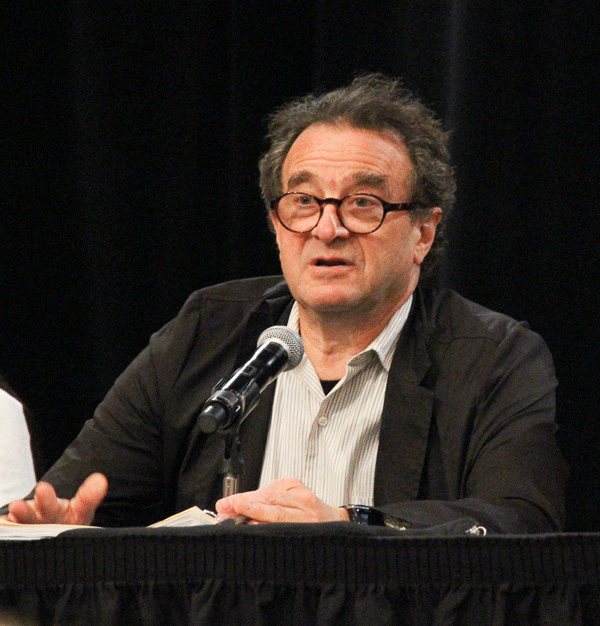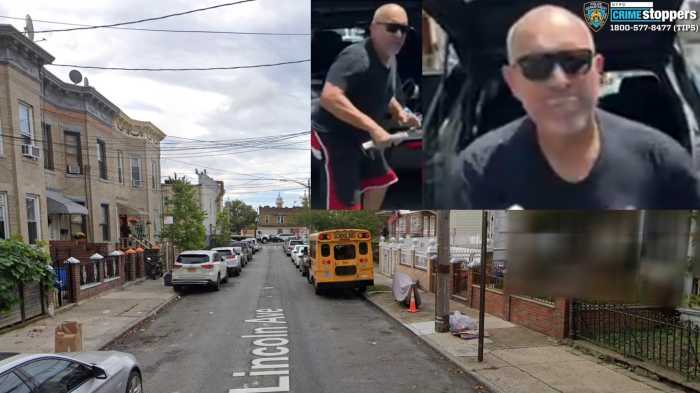
BY LINCOLN ANDERSON | By an overwhelming vote, Community Board 2 last week passed an “emergency resolution,” reiterating its support for the permanent preservation of the entire Elizabeth St. Garden as a public open green space, and urging the city to transfer the site to Parks Department jurisdiction.
The resolution also urged the Lower Manhattan Development Corporation to “adhere to its own guidelines” and not provide funding for “a project that has not even been presented to the community, much less demonstrated a ‘high level of community interest and support.’ ”
The vote was about 40 to 4.
However, the de Blasio administration and City Councilmember Margaret Chin, so far, have turned a deaf ear on C.B. 2 and the majority of neighborhood residents living near the garden, instead doggedly pushing ahead with plans for a senior affordable housing project on the large, block-through lot, officially known as 21 Spring St.
The board’s resolutions are advisory only.
The city is seeking a $6 million federal grant from L.M.D.C. for the housing, whose total cost would be $20 million to $24 million. The development would include from 60 to 100 apartments, as well as ground-floor retail.
Yet, L.M.D.C. regulations for allocating the funds, as noted by C.B. 2 in its emergency resolution, mandate a “high level of community interest and support.”
To the contrary, community opposition strongly outweighed community support at a Sept. 17 L.M.D.C. hearing on the funding application. More than 200 garden supporters who live right around the green space turned out in force, versus only about 50 housing advocates — many of them brought over by van from Chinatown by Hamilton-Madison House, which is located more than a mile away from the garden. That said, both sides were passionate about their cause.
The vote by C.B. 2 on its emergency resolution roughly mirrored the one from early 2014 when the board first voted to save the garden, while also vowing to work to relocate alternative sites for affordable housing in the district. Since the first resolution, the board’s chairperson, Tobi Bergman, has identified an alternative city-owned site for the affordable housing — at Hudson and Clarkson Sts. — which the board’s Executive Committee last month unanimously supported by a 16-0 vote.
Speaking last Thursday evening before the board voted on the emergency “reso,” Bergman said it was “problematic” that the thorny problem involved “a big issue for the city and the mayor,” namely, affordable housing.
C.B. 2 has been unable to establish any dialogue about the issue with the Department of Housing and Preservation, the lead agency on the planned housing project, Bergman said.
“We can’t get any traction with the agency,” he said.
Bergman said that H.P.D., by not working with C.B. 2 to help save the Elizabeth St. Garden, would be setting itself up for failure on other potential housing projects coming down the pike.
“It’s a liability for affordable housing in any other area,” he said. “You can’t run over people in one area and then expect them to lie down on the tracks in another area. The St. John’s Building will have affordable housing. That will be a very big building.
“It kind of sounds like a threat, but it’s not a threat. The world doesn’t work that way. I don’t know if anyone from H.P.D. is here today, but that’s the message we want to send,” he told the meeting.
Developers of the St. John’s Center — the former High Line rail terminal, located across the West Side Highway from Pier 40 at W. Houston St. — would be expected to buy available development rights from the pier to add into the massive project. In turn, C.B. 2 would be expected to push for affordable housing as part of the St. John’s development.
Bergman later clarified that he wasn’t saying the board would try to “punish” H.P.D. if the Elizabeth St. Garden is destroyed.
Rather, he said, “What I was trying to say is that there are important projects coming up in C.B.2 and there are great opportunities. But they will all involve building big buildings that some people will object to, and it will be hard to build support for affordable housing projects when people are angry about another affordable housing project that would be harmful to the community.”
Tom Connor was among a few board members who spoke in favor of the housing on the garden site.
“The way the pope said today, you have to listen to your conscience,” said Connor, chairperson of the Greenwich House Senior Advisory Board.
However, Sandy Russo, another senior on the board, said she welcomes the garden because the neighborhood so sorely lacks open space.
“I’m 75. As a walker, I like to sit there. The powers that be set it up as an either-or-situation,” she said of the garden-versus-housing struggle.
“There are sites now that are vacant that no one has put their marker on,” she said, “especially in the West Village, a block away from where I live.”
In that vein, Elaine Young offered, “We can have both. I don’t know why there’s this ‘either or.’ I think it’s horrible if we don’t protect this park.”
The lot at Hudson and Clarkson Sts. was used for drilling a water shaft down to the new City Water Tunnel No. 3. Identifying another potential alternative site, Sean Sweeney noted there’s also a water-shaft site not too far away at Lafayette and Grand Sts.
“Why don’t we use that site and build the housing there and save the garden?” he suggested.
Meanwhile, Susanna Aaron, who voted for the affordable housing in January 2014, last week reversed herself and said she now supports saving the garden.
“In the two years since we have taken that vote, the facts on the ground have changed,” she said. “The [Hudson Square] alternative site isn’t exactly the same as having affordable housing in Nolita but it’s a workable compromise.”
Striking a poetic note, Keen Berger quoted the song “Bread and Roses,” by legendary folk singer Joan Baez.
“A person needs bread and roses to live,” Berger said. “You really need beauty and sustenance. You need housing (bread) — but that doesn’t mean you take away the garden (the roses).”
Robin Goldberg, who lives in the area, said of the garden, “It’s already established. It would really be an injustice to chop down those trees.”
Dan Ballen voted for the housing in January 2014, but, unlike Aaron, has not changed his view since then. It doesn’t matter, he asserted, if more families currently use the garden than would benefit from the housing.
“Even if the housing is less impactful for more families, it’s a safer, better neighborhood [for the affordable housing tenants],” he said.
Throwing cold water on Bergman’s idea of a West Side alternative, Ballen implied that such ideas are ultimately unrealistic.
“The alternative sites are a red herring,” he argued, adding that trying to shift the housing project’s location would be impractical in the “morass of city agencies.”
Simply put, he said, the board should only consider the options for the one site and not complicate matters.
“This is, in a vacuum, a park or affordable housing,” he stated.
A bristling Bergman snapped at Ballen, “It seems to me that you’re taking the side of an agency when they ignored us,” adding that the “process has not begun” for the garden.
In the audience, Soho activist Pete Davies, a staunch garden supporter, clapped his approval of Bergman’s defiant stance, and thrust his fist up in the air in support.
Supporting Bergman, Rich Caccappolo, chairperson of the board’s Parks and Waterfront Committee, said H.P.D. has so far given the board barely any specifics about the housing project.
“Do you have any idea how many units? What it’s going to look like?” he said, looking toward Ballen. “We spoke to H.P.D., they told us it’s not even a great lot for what they want to build there.”
Bergman, speaking to The Villager, later chided himself for taking a sharp tone with Ballen.
“Board members, especially the chairperson, should debate in a collegial manner,” he said. “Passion is great, but not anger. I think it is the first time I have done that in my 17 years on the board, so I hope it will be like a 17-year locust.”
Meanwhile, The Villager asked H.P.D. to respond to Bergman’s accusation that the agency has, thus far, ignored the community board’s pleas to discuss ideas on how the Elizabeth St. Garden can be saved. The response indicated that the agency considers the housing to be nonnegotiable.
“As we’ve publicly stated,” an H.P.D. spokesperson told the newspaper, “we are in the very early stages of the planning process at the site located at Spring and Elizabeth Sts. We will continue to meet and engage with members of Community Board 2 and all stakeholders before the release of any future Request For Proposals for the site. We look forward to working alongside the board, local elected officials and residents to discuss this site and other projects in their district.”
Told of the agency’s answer — that they are willing to work with C.B. 2 on the planned housing — Bergman said, “And we are happy to work with H.P.D. on anything but.”




































